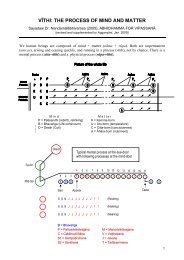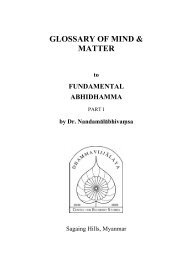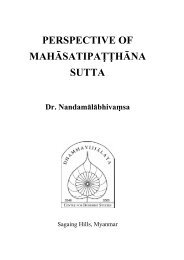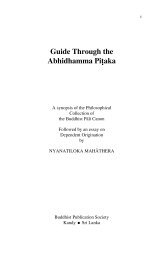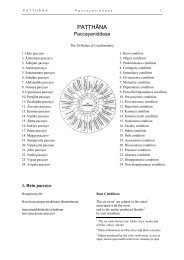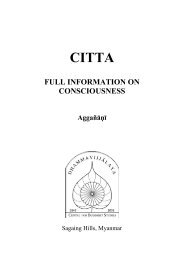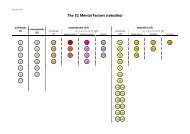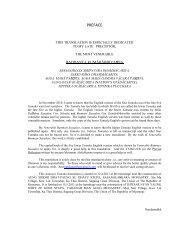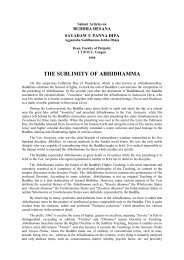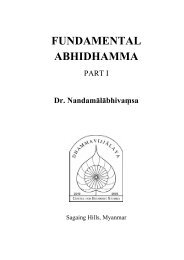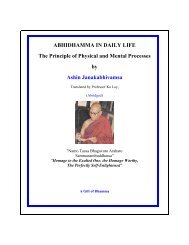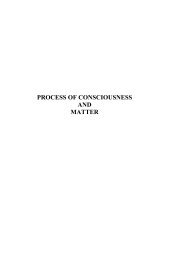Mahathera Ledi Sayadaw - Abhidhamma.com
Mahathera Ledi Sayadaw - Abhidhamma.com
Mahathera Ledi Sayadaw - Abhidhamma.com
You also want an ePaper? Increase the reach of your titles
YUMPU automatically turns print PDFs into web optimized ePapers that Google loves.
No-soul. Thus through the hallucination of perception we apprehend things erroneously in exactly<br />
the same way that the wild deer take the straw man to be a real man even with their eyes wide<br />
open.<br />
Now for the simile of the magician to illustrate the hallucination of thought.<br />
There is a pretended art called magic by means of which when lumps of earth are exhibited in the<br />
presence of a crowd, all who look at them think they are lumps of gold and silver. The power of<br />
the magical art is such as to take from men their ordinary power of seeing and in its place put an<br />
extra-ordinary kind of sight. It can thus for a time, turn the mind upside down, so to speak. When<br />
persons are in <strong>com</strong>mand of themselves they see lumps of earth as they are. But under the<br />
influence of this magical art, they see the lumps of earth as lumps of gold and silver with all their<br />
qualities of brightness, yellowness, whiteness, and so forth. Thus, their beliefs, observations, or<br />
ideas, be<strong>com</strong>e erroneous. In the same way our thoughts and ideas are in the habit of wrongly<br />
taking false things as true and thus we delude ourselves. For instance, at night, we are often<br />
deceived into thinking we see a man when it is really the stump of a tree that we are looking at.<br />
Or, on seeing a bush, we imagine we are looking at a wild elephant; or, seeing a wild elephant<br />
take it to be a bush.<br />
In this world all our mistaken ideas as to what <strong>com</strong>es within the field of our observation, are due<br />
to the action of the hallucination of thought which is deeper and more unfathomable than that of<br />
the perception, since it deludes us by making false things seem true. However, as it is not so<br />
firmly rooted as the latter, it can easily be removed by investigation or by searching into the<br />
causes and conditions of things.<br />
Now for the simile of the man who has lost his way, to illustrate the hallucination of views.<br />
There was a large forest haunted by evil spirits, demons, who lived there building towns and<br />
villages. There came some travellers who were not acquainted with the roads through the forest.<br />
The demons created their towns and villages as splendidly as those of Devas, or celestial beings<br />
and themselves assumed the forms of male and female Devas. They also made the roads as<br />
pleasant and delightful as those of the Devas. When the travellers saw these, they believed that<br />
these pleasant roads would lead them to large towns and villages, and so, turning aside from the<br />
right roads, they went astray following the wrong and misleading ones, arriving at the towns of<br />
the demons and suffering accordingly.<br />
In this allegory, the large forest stands for the three world of Kama-loka, Rupa-loka and Arupaloka.<br />
The travellers are all those who inhabit these worlds. The Right Road is Right Views; and<br />
the misleading road is Wrong Views. The Right Views here spoken of are of two kinds, namely,<br />
those that pertain to the world, and those pertaining to Enlightenment. Of these two, the former is<br />
meant to connote this right view; "All beings are the owners of their deeds; and every deed, both<br />
moral and immoral, <strong>com</strong>mitted by oneself is one's own property and follows one throughout the<br />
whole long course of life" while the latter is meant to connote the knowledge of the Doctrine of<br />
Causal Genesis, of the Aggregates, of the Ayatana (Bases), and No-Soul. Of these two views, the<br />
former is as the right road to the round of existences. The worlds of the Fortunate (i.e., the abodes<br />
of human beings, Devas, and Brahmas), are like the towns of good people. The erroneous views<br />
that deny moral and immoral deeds and their results or effects, and <strong>com</strong>e under the names of<br />
Natthikaditthi, Ahetuka-ditthi, and Akiriya-ditthi, are like the wrong, misleadfing roads. The<br />
worlds of the Unfortunate which are the abodes of the tortured, of Animals, Petas, and Asuras, are<br />
like the towns of the demons.<br />
The right view of knowledge which is one of the factors of Enlightenment, is like the right road<br />
that leads out of the round of existence. Nibbana is like the town of good people.




